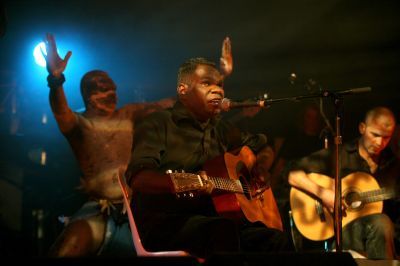Gurrumul, the star who 'just wants to go home'

Your support helps us to tell the story
From reproductive rights to climate change to Big Tech, The Independent is on the ground when the story is developing. Whether it's investigating the financials of Elon Musk's pro-Trump PAC or producing our latest documentary, 'The A Word', which shines a light on the American women fighting for reproductive rights, we know how important it is to parse out the facts from the messaging.
At such a critical moment in US history, we need reporters on the ground. Your donation allows us to keep sending journalists to speak to both sides of the story.
The Independent is trusted by Americans across the entire political spectrum. And unlike many other quality news outlets, we choose not to lock Americans out of our reporting and analysis with paywalls. We believe quality journalism should be available to everyone, paid for by those who can afford it.
Your support makes all the difference.On his first tour of Europe but fast becoming the talk of the town, upcoming world music sensation Geoffrey Gurrumul Yunupingu, the blind Aboriginal with the voice of an angel, "just wants to go home".
"He hates travelling," said his friend, manager, producer and spokesman from Melbourne, Michael Hohnen. "He's happy and content sitting with his family on his island, eating stingray, singing songs, telling stories, just being social."
"Ever since we left Australia he just wants to go home," he told AFP this week.
Though Gurrumul may hate showbiz, he pulled off something of a coup by performing a duo in Paris a few days ago with none other than Sting, which airs on television and the Internet on December 16.
And his first album, just released in Europe after being a hit in Australia, has sold more than 250,000 copies - a more than respectable figure for the world music genre. But Hohnen says sales could soar if the media-shy star finally agreed to meet the press and talk on TV.
"During the actual gigs he's in his element as a musician and as a singer," said Hohnen, who met the 38-year-old singer-songwriter more than a decade ago on his Elcho Island home off the coast of remote Arnhem Land in northern Australia, where Gurrumul plays in a group called Saltwater Band.
"But he doesn't like being the centre of attention. It's taken me a long time to convince him he can be centre-stage."
The reluctant star never gives interviews, singing about ancestry, country, spirits and land - mostly in the Yolngu dialect of the Gumatj clan - while Hohnen deals with the press and the practicalities.
"He doesn't see the point of interviews," Hohnen said. "And he doesn't see himself as a spokesman for his people."
Unlike other young people who leave family and country behind to find themselves on reaching adulthood, Aboriginal people know who they are and where they come from at birth, says Hohnen, who plays double bass with Gurrumul.
Enjoy unlimited access to 100 million ad-free songs and podcasts with Amazon Music
Sign up now for a 4 month free trial (3 months for non-Prime members)
Enjoy unlimited access to 100 million ad-free songs and podcasts with Amazon Music
Sign up now for a 4 month free trial (3 months for non-Prime members)
"They all grew up together in houses full of people and they do everything together," Hohnen said. "He takes all his songs to his uncles and all of the family see all of his songs as 'my' song."
"I wanted to do something for aboriginal people and help them form a band," he added. "I said they should record and take their music elsewhere."
Though the number with Sting worked out well, the rehearsal was dire, Hohnen said, because Gurrumul couldn't tune in to the love story in "Every Breath You Take" that was alien to indigenous music.
From an ode to orange-footed scrub fowl or python ancestors to songs about sunsets and storm clouds and grief, Gurrumul cuts to the quick with a voice Britain's Independent hailed as "timeless, nostalgic and haunting".
The Times described it as being "as sumptuously soothing as a log fire on a freezing night".
Gurrumul speaks some English and Hohnen speaks some Aboriginal dialects, but says "we don't talk that much".
During his time on the island with the family, Hohnen said, he began to feel that Gurrumul's special voice was lost in the band. "He was one of a couple of singers and didn't understand. I'd hear his voice in my head. But emotionally I convinced him. I always believed he was international standard."
What next for Gurrumul? "One step at a time, we need to check," said his mate.
Join our commenting forum
Join thought-provoking conversations, follow other Independent readers and see their replies
Comments